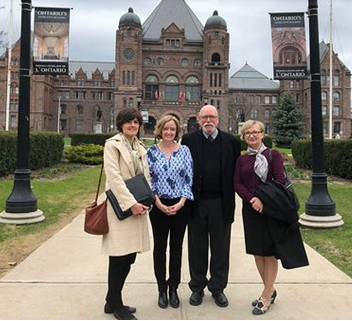 By Lynn Crosby, David Myers, Deborah Ruse, 0Blair Smith, Josie Wagstaffe
By Lynn Crosby, David Myers, Deborah Ruse, 0Blair Smith, Josie Wagstaffe
July 28th, 2019
BURLINGTON, ON
Last May the province dumped a new piece of legislation on the public that has serious and significant impact on the way the province provides housing.
I wrote the Provincial Planning Policy Branch doing the review of the Planning act and made the following comments:
Reference: 019-0016 Bill 108 – (Schedule 12) – the proposed More Homes, More Choice Act: Amendments to the Planning Act
Dear Minister,
Thank you for the opportunity to provide comments on the proposed Bill 108.
 We are the WeLoveBurlington Advocacy Group. We are distinctly ‘grass roots’ and non-partisan. We advocate on a broad range of issues that affect the City of Burlington and its citizens.
We are the WeLoveBurlington Advocacy Group. We are distinctly ‘grass roots’ and non-partisan. We advocate on a broad range of issues that affect the City of Burlington and its citizens.
At the outset, we would like to note several directions and tendencies of the current provincial government that have given us cause for ongoing concern and which we see unfortunately reflected in Bill 108.
First, a general rush to precipitous action with insufficient consultation with affected parties, interest groups and citizens generally. We understand that Bill 108 and its consequences are entirely within the powers and prerogatives of the provincial government. However, we firmly believe that appropriate and timely consultation with the electorate is a fundamental principle of the democratic process. Such has not occurred here.
Second, a tendency to download program funding and operational responsibilities with little consideration of their ultimate financial or operational impacts. Indeed, in many cases these potential effects are both unidentified and unclear resulting in a needlessly dynamic policy context and unfunded budgetary pressures. The result will predictably be reduced services, higher tax burdens and larger municipal debt.
Third, a tendency to disrupt and overload the existing framework of municipal services by imposing a quantum of change that is beyond the limited capacity of the municipality to accommodate. Bill 108 is simply the latest example of a series of provincially imposed changes to local municipal program delivery that were unplanned, unanticipated and threaten to render dysfunctional an already over-extended system.
In reviewing the proposed Bill we have multiple concerns but have limited our comments, given the very brief amount of time allowed for response and comment, to those that follow.
Threats to Bio-Diversity
The consequences of global heating and the need for preservation of bio-diversity are of the utmost importance to our province and our country in the 21st century. Unfortunately, instead of increasing the strength of our protections for these crucial needs, Schedule 5 of Bill 108 makes it easier for plants and wildlife habitat to be destroyed. If enacted as proposed, Bill 108 would lead to significant delays and uncertainty regarding listing of species at risk, provide for more exceptions and mechanisms for escaping the prohibitions, severely limit the government’s actions to protect and recover species at risk, and remove requirements for the Minister to consult with species experts. The amendments would also allow proponents to harm some species at risk in exchange for benefiting others (through landscape agreements) and create a mechanism where proponents can pay a regulatory charge in lieu of meeting conditions on a permit designed to protect and recover species or its habitat. The new term “pay to slay” that is finding traction with constituents is an apt if somewhat grotesque label.
Schedule 5 will accelerate the decline of species. This is not a trade-off voting constituents are willing to support.
Schedule 5 should be eliminated from this Bill in its entirety.
Shorter Timelines for Review of Applications
Setting shorter timelines for the review of development applications directly impacts the ability of municipal planning staff to deal with the comprehensive nature of applications, consult with the public, or seek collaboration with applicants. Instead of allowing for the community and parties to work together, shortened timelines will increase adversity. There are impractical timelines for staff and Council for even the most simple, straightforward applications. The result will be even more appeals for non-decisions, thereby defeating the desire to increase housing faster.
Return to de novo Hearings
While the LPAT remains, it will no longer evaluate appeals based on compliance with official plans and consistency with provincial plans/policies. Bill 108 returns it to the more adversarial OMB process and, as such, a return to de novo hearings. This is very disappointing for residents and municipal governments, as it takes final planning decisions out of elected councils’ hands. Historically, the use of a de novo approach to appeals has resulted in drawn out hearings, lags in decisions and a backlog of cases. The return to this process has no positive effect to speed up housing development. This aspect of Bill 108 has been characterized as a return to the substance (if not the fact) of the former Ontario Municipal Review Board. We agree and consider it a fundamental flaw of the proposed legislation.
Parkland and Development Charges
A long-standing tenet of land use in Ontario, as established by the province and undertaken by municipalities, is for the building of complete communities – places where homes, jobs, schools, community services, parks and recreation facilities are easily accessible. As intensification and vertical housing become more prevalent, particularly in cities such as Burlington that are targeted for intensification, access becomes even more important.
For decades, the province has allowed municipalities to require parkland based on number of units being built, creating a direct relationship to the number of people living in a new development. If cities choose to keep a limited version of the parkland dedication by-law, they lose the ability to collect land or cash based on units built and are limited to require 5% of the land area of the new development. A 5% requirement on a small site being used for a high-rise development does not deliver a “park” space for residents that will contribute to livability in any manner.
Our parks are critical pieces of infrastructure that not only help to alleviate the effects of global heating but also play a pivotal role in creating places where people actually want to live. Further, Bill 108 compels cities to spend 60% of the money they collect each year, thus making it harder for cities to save up funds for larger park projects and land purchases.
Not only does Bill 108 severely curtail the ability for cities to require developers to provide parkland onsite, it also removes the ability for those same cities to use development charges to collect money for parks and other soft infrastructure. The proposed new development charges amalgamate many of the tools cities have used for things such as affordable housing and turned them into either/or situations. These restrictions are exacerbated by a yet-to-be identified cap the government will announce at a later date.
No Answers to Affordable Housing
Bill 108 does not provide for any mechanisms to ensure that reduced development costs are passed through to future home buyers and renters.
In large part the development industry is permitted to build the product it most wants, wherever it desires and sell it at whatever price it chooses.
Allowing municipalities to utilize inclusionary zoning as one of a suite of tools to address and increase the supply and integration of affordable housing through private development represents a more effective manner with which to create affordable housing. By doing so, municipalities maintain the flexibility to utilize the tools most appropriate to the local context.
In Summary
Bill 108 does not represent the government action voting constituents want from provincial leaders. The City of Burlington and municipalities like it across Ontario have well planned strategies for growth with specific areas identified for intensification and new development.
Reasonable timelines are in place to ensure professional review and assessment of development applications while providing constituents with a voice. The City of Burlington currently has in place an Interim Control Bylaw that has imposed a hiatus on development applications for one (potentially two) years. The bylaw was enacted as a necessary mechanism to cope with both the volume and the complexity of current development applications. This would override it and introduce virtual chaos into the evaluation and approval process.

Lynn Crosby, Deborah Ruse, Blair Smith, Josie Wagstaffe
We strongly urge you to pause Bill 108 in its entirety and work in tandem with the City of Burlington, the Halton Area Planning Partnership and like bodies across Ontario to attain plans and policies that reflect clarity, consideration and certainty in managing growth, delivering suitable development for our population and building infrastructure that works in favour of the people and the environment.
If the current government is truly “a government of the people” receiving its direction from ‘the people’, then it needs to both listen to their voice and permit them the time to articulate it.
Sincerely, Lynn Crosby, David Myers, Deborah Ruse, 0Blair Smith, Josie Wagstaffe


















I think we should note that this letter was sent back on May 31, and since that time we received a response from Jane McKenna and replied back to her, etc. – these letters were also reported back at that time. The Gazette has reprinted our original submission here again, but lots has happened since! Thanks to everyone for continuing to follow our posts and our work and for the growing support we are receiving. It is much appreciated and is proof that a small group of people can make an impact.
I admire the dedication of the WLB group and this article is extremely well researched and presented.
However, I do not like the tone set by the follow up comments to DL’s brief comment. Obviously the subtext of DL’s comment is “who the heck are you and how do you represent my city”. Regardless, I hope he will always have a forum here to express his views no matter how disingenuous they are. If you read other online news organs like CBC of Huffington Post, many comments will be negative about the original post and often very unpleasant; it’s one of life’s less pleasing elements. DLs comment is a cheap shot, but lets keep the response proportional.
Talk of censorship is ill advised and just plain silly. If comments offering a negative view of the original article are going to be removed then I for one will stop getting my daily Burlington news fix from the BG.
Editor’s note: DL’s comment has yet to be posted – waiting to confirm just who or she is. The Gazette is not going to permit the use of just initials.
If people want to attack, then attack the message, not the messenger. That’s a classic fallacy – attack the speaker.
It indicates that DL (or whoever similar) is like a lawyer who doesn’t have a case to present, so they attack the opposition.
Opposing critical ideas about the message might make a contribution to discussion and debate here.
Unthinking cheap shots just pee people off.
May I ask how many members in the We love Burlington group?
May I ask what your full name is, for a picture too, for transparency like the We Love Burlington group.
And how many other members are in your secret society of one at the moment.
Touche Tom! My question would be: why are readers like DL who post comments using one name, pseudomyms and initials even allowed to post comments at all? Printed newspapers and publications don’t accept Letters to the Editor written by anonymous sources, so why should an online publication? The Burlington Gazette should not provide a forum or voice for those who lack the courage to stand up for their convictions.
This behaviour is clandestine and should not be permitted!
Editor’s note: Stephen White raises a strong point – one that perplexes the Gazette. Our resources are very very limited. It takes time we do not have to chase down every commenters. There are now more than 100 people who comment – we do confirm that an email address is real.
In order to stay on top of the commenters we would have to create a data base with names and the IP address and then run every comment through the data base. We just don’t have the time to do that.
We trust that most of the people who comment are honest and while we are not always certain they mean well – they have a viewpoint and we have a platform they can use to make that viewpoint public.
It is a dicey game. We trash quite a few of the comments and on occasion communicate directly with a commentator and ask them to re-write a comment and tone it down.
We are frequently asked to discontinue the comments section. The requests usually come from people who don’t like the freedom people have with our comments section.
At some point – we would like to e able to create a system that allows us to confirm the authenticity of every commenter. That level of facility is expensive to create and takes time to administer.
There are some people who, because of the public position they hold have asked if they could use a pseudorandom.
Are we doing what we should be doing? We are not certain – if there is anyone with some ideas – let us have them.
Thank you Tom. WeLoveBurlington consists of five founding members and a limited number of ad hoc associates who provide us with their perspective and can both challenge and inform our positions. We are few in number by intent and by design. We deliberately formed as a non-partisan, collegial working group, a “ leaderless comitatus”, with no hierarchy and no formal communications protocol. As such, we believe that we can advocate more effectively, identifying and addressing issues quickly when they arise and pivoting as political winds change. Our primary role, as we see it, is to raise awareness of issues that affect the City of Burlington and its citizens since an informed and knowledgeable citizenry is the most important part of any democracy.
This should be required reading for all Halton residents to get an idea of the magnitude of the issue. We will all pay for mistakes made now and recovery from these mistakes will take years, if recovery comes about at all. Well written letter, the writers of which shouldn’t be referred to as the Lovelies as it seems rather denigrating for such serious writings.